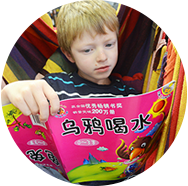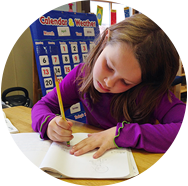
Grade-Appropriate Resources and Activities
To prevent declines in skills during summer break, we strongly encourage students to engage in recommended activities across all academic disciplines to keep their skills sharp. Research demonstrates that learning loss can be averted when students consistently spend time on academic tasks during summer.
Get into the Daily Math Mindset This Summer
In addition to encouraging structured practice in math workbooks, show your child that doing math is a natural, everyday occurrence. To help you find daily “math moments,” here are a few suggestions by grade level:
1st–3rd Grades
- Keep a tally of things you see on your next road trip. Give your child a “Road Trip Scavenger Hunt” to count cows, water towers, or airplanes.
- Bake a cake together–and have your child be responsible for the measuring.
4th and 5th Grades
- Bake cookies, a cake, biscuits, and more. Make your child the “Official Measurer,” or take it a step further and let your child make dessert by following a recipe (with your supervision).
- Encourage your child to estimate the number of people in a crowd (at the beach, in line for tickets, etc.) by practicing extrapolation.
6th–8th Grades
- Next time you’re at your local swimming pool, have your child approximate the volume of water in pool.
- Stopping at the grocery store to pick up a few things? Have your child add up the grocery bill before you get to the check-out counter.
Recommended Reading: Books Your Child Should Read This Summer
Reading during summer break can help foster a lifelong love of books. Encourage your child to read throughout the summer months. Below you’ll find some of our summer reading picks by grade level. Please note that these books are age-appropriate and recommended by education experts. However, some books may contain content that is not suitable for all readers. Please help your child choose books that are just right.
1st- to 3rd-Grade Reading List
- Mr. Popper’s Penguins by Florence Atwater
- Matilda by Robert Dahl
- Fudge Series by Judy Blume
- Bunnicula by Deborah and James Howe
- Because of Winn Dixie by Kate DiCamillo
- Ramona Quimby by Beverly Cleary
- How to Eat Fried Worms by Thomas Rockwell
- Boxcar Children Series by Gertrude Chandler Warner
4th- and 5th-Grade Reading List
- Flora and Ulysses by Kate DiCamillo
- Esperanza Rising by Pam Muñoz Ryan
- A Wrinkle in Time by Madeleine L’Engle
- The Golden Compass by Philip Pullman
- Tuck Everlasting by Natalie Babbitt
- I Am Malala by Malala Yousafzai
- Percy Jackson and the Olympians Pentalogy by Rick Riordan
6th- to 8th-Grade Reading List
Novels
- Hello, Universe by Erin Entrada Kelly
- Return to Sender by Julia Alvarez
- Red Kayak by Priscilla Cummings
- The Outsiders by S.E. Hinton
- All American Boys by Jason Reynolds and Brendan Kiely
- Peter and the Shadow Thieves Series by Dave Barry
- Sophie Quire and the Last Storyguard by Jonathan Auxier
- Soar by Joan Bauer
- When Friendship Followed Me Home by Paul Griffin
- Terror at Bottle Creek by Watt Key
- A Night Divided by Jennifer A. Nielsen
- Ghost by Jason Reynolds
- Beneath by Roland Smith
- Falling Over Sideways by Jordan Sonnenblick
- 23 Minutes by Vivian VandeVelde
- Wolf Hollow by Lauren Wolk
Graphic Novels
- Delilah Dirk and the King’s Sibling by Tony Cliff
- Gotham Academy: Welcome to Gotham Academy by Becky Cloonan
- Feathers by Jorge Corona
- Geis: A Matter of Life and Death by Alexis Deacon
- The Dumbest Idea Ever! by Jimmy Gownley
- The Nameless City: Volume 1 by Faith Erin Hicks
- Four Points: Compass South by Hope Larson
- Snow White by Matt Phelan
- Tomboy by Liz Prince
- Orange: The Complete Collection, 1 by Ichigo Takano
Non-fiction
- The Universe in a Nutshell by Stephen Hawking
- The Greatest Stories Never Told by Rick Beyer
Community Connection:
Links to Reading Resources
Many local organizations offer summer reading programs for school-age children.
-
- Baltimore City: Enoch Pratt Free Library
- The Book Thing of Baltimore
Cursive Writing:
Links to Practice Books You Can Buy
Cursive writing is taught in TNCS’s elementary program, and using it is required for all students grades 2 and above. The fun, game-based workbooks below will help keep students’ fine motor skills sharp and improve their penmanship.
Also check out the sections below for other fun ways to practice cursive writing.
8 Fun Writing Activities for Kids to Practice This Summer
- Keep a journal.
- Help make lists.
- Write a letter to a friend from school.
- Send a postcard to a family member.
- Be a critic: Write a review for a restaurant, hotel, book, or movie.
- Send an email to a family member or friend.
- Respond to news or magazine articles.
- Compose a fictional story or poem.
Additional Writing Tasks for Grades 4th–8th
- Summarize and write about a possible sequel to a book you read.
- Write a diary entry as if you were one of the characters in the book.
- Write a scene or story in which the character(s) travel out of the book into today.
- Write a pitch to a movie producer explaining why the story would make a great movie.
- Write an article about the information you have learned and how it will have an impact on the world.
- Create a new book jacket for your book. Include the title and author on the front. Inside, summarize the text with key details to support your main idea.
- Create an informational brochure on the information that you learned from your text. Include the title and author of the book.
- Create a commercial based on 7 or 8 new facts that you have learned. Include the title and author of the book.
- Write a letter to the author of a book you read explaining the most important information you learned from the book and questions you may still have.
Science Websites & Apps
Encourage your child to apply scientific concepts to everyday life. Enroll in a STEM-based camp like Camp Invention. And, when it’s time for screen time, load up the science sites and apps below.
Science Grades K–2nd
- PBS Kids http://pbskids.org/games/science/
- National Geographic Kids www.kids.nationalgeographic.com
- NASA www.nasa.gov
Science Grades 3rd–8th
- PBS Kids: http://pbskids.org/games/science/
- National Geographic Kids: www.kids.nationalgeographic.com
- NASA: www.nasa.gov
- Physics Classroom: www.physicsclassroom.com
- Middle School Chemistry: www.middleschoolchemistry.com
- Khan Academy: www.khanacademy.org
- How Stuff Works: www.howstuffworks.com
- Science Daily: www.sciencedaily.com
- National Geographic: www.nationalgeographic.com
- Astronomy.com: www.astronomy.com
- Space.com: www.space.com
- Space Telescope: www.spacetelescope.org
Spanish Language Websites & Reading Lists
Keep your child’s Spanish language skills in practice by reading in Spanish, attending Spanish Immersion Camp, and by visiting the websites below.
Spanish Websites
- Babbel: www.babbel.com
- Aprender Español: www.aprenderespanol.org
- Duolingo: www.duolingo.com
- Orientatión Anjúgar: https://www.orientacionandujar.es/
Spanish Grade 3
- Junie B.Jones y el autobús tonto y apestoso by Barbara Park
- Mi Hermana Magica by Anne Mazer
- Sofia La Millonaria by Laura Bergen
- Cuentos Clásicos by Scholastic en Espanol
- Cuentos Fonéticos by Scholastic en Espanol
Spanish Grades 4 and 5
- Las Aventuras de Miguelito by Fabiola Canale
- Victor Shmud Experto Total by Jim Benton
- Los Tipos Malos by Aaron Blabey
- Maria Curie: Una Cientifica Audaz by Keith Brandt and Joanne Mattern
- Brandon Brown Quiere un Perro by Carol Gaab
- El Viaje by Deb Navarre
- El Escape Cubano by Mira Canion
Spanish Grade 6
- Diario de Una Lechuza by Rebecca Elliott
- Iguales pero Diferentes by Jenny Sue Kostecki-Shaw
- Las Hadas de la Escuela by Daisy Meadow
Spanish Grade 7
- Pobre Ana by Blaine Ray
- El Enmascarado de Lata by Vivian Mansour
- El Nuevo Houdini by Carol Gaab
- La Calaca Alegre by Carrie Toth
Spanish Grade 8
- Quien fue Martin Luther King Jr? By Bonnie Bader
- Quien fue Abraham Lincoln? By Janet B. Pascal
- Quien fue George Washington? By Roberta Edwards
- Luciana by Erin Teagan
- Quien Fue Harriet Tubman? By Yona Zeldis McDonough
- El Lazarillo de Tormes By Anonymous
- Iktan y la Pirámide de Chichen Itza, Una aventura Maya by Raquel García Prieto
- El Principito by Antoine de Saint-Exupery
- Don Quijote de la Mancha (Special Edition for Children) by Rosa Navarro Duran

Chinese Learning Resources
Don’t let your child’s Chinese language skills diminish over the summer break. Enroll in Chinese Immersion Camp for grades K to 8, and provide your child with the resources below.
Chinese: K–1st and Beginners
- Chinese character practice: The First One Hundred Chinese Characters
- Duolingo: https://www.duolingo.com/course/zh-CN/en/Learn-Chinese-Online
Chinese: 2nd–7th and Advanced
- Chinese character practice: Learning Manadrin Chinese Characters, Volume 1
- Duolingo: https://www.duolingo.com/course/zh-CN/en/Learn-Chinese-Online

